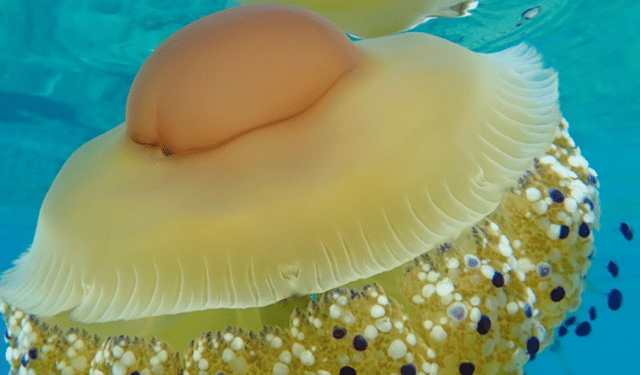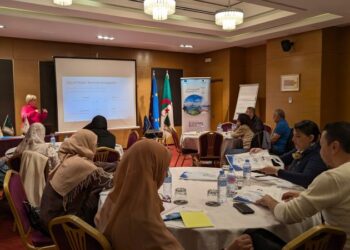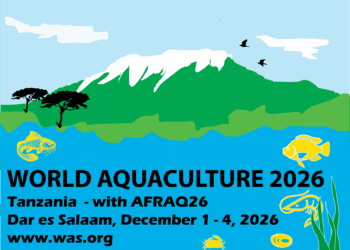Learn more about the fried egg jellyfish – In recent years, the Mediterranean Sea has become increasingly crowded with marine species. After the arrival of the blue crab and the worm, it is now the turn of the Cotylorhiza tuberculata, commonly known as the fried egg jellyfish. This jellyfish, easily recognisable by its fried egg-like appearance, is invading our shores, driven by global warming and the decrease in its natural predators.
What is Cotylorhiza tuberculata?
The fried egg jellyfish owes its name to its characteristic yellowish-white appearance reminiscent of a fried egg. With a diameter of between 20 and 35 centimetres, it is easily recognisable in Mediterranean waters.
Global warming and the proliferation of jellyfish
Rising sea temperatures
The warming of marine waters encourages the proliferation of Cotylorhiza tuberculata, allowing jellyfish to survive and reproduce more.
Decrease in natural predators
The decrease in natural predators, such as sea turtles and specific fish, has contributed to the increase in jellyfish populations due to human activities and climate change.
Impacts on marine life and tourism
Effects on the ecosystem
Fried egg jellyfish play a crucial role in the marine ecosystem, feeding on plankton and providing a habitat for small fish and invertebrates. However, their proliferation may indicate environmental problems, such as rising sea temperatures and decreasing natural predators.
Impacts on bathing activities
The massive presence of jellyfish can negatively affect beach tourism. However, Cotylorhiza tuberculata does not pose a serious danger to humans, as it does not cause significant irritation. Correct information can reduce concern among bathers and maintain tourist attendance.
Cotylorhiza tuberculata represents an interesting case study on climate change and its impact on the marine ecosystem. Informing the public correctly about the real risks and benefits of these jellyfish can help maintain the balance between biodiversity conservation and tourism activities.
Nourishment and the food chain
Diet and predation
Cotylorhiza tuberculata feeds mainly on plankton, which includes small organisms such as algae, protozoa, small crustaceans and fish larvae. By consuming plankton, this jellyfish helps maintain the balance of planktonic populations, preventing overcrowding of these micro-organisms in the marine ecosystem.
Prey and predators
- Predators of the jellyfish: sea turtles, some pelagic fish and other marine predators feed on Cotylorhiza tuberculata. This makes it a key component of the marine food chain, integrating the transfer of energy between different trophic levels.
- Habitat for other species: the tentacles of the jellyfish provide shelter and protection for small fish and invertebrates, which find shelter from larger predators among its appendages.
Environmental indicators
Ecosystem health
The presence and abundance of Cotylorhiza tuberculata can be used as indicators of marine ecosystem health. An increase in jellyfish populations may indicate changes in environmental conditions, such as warming waters and a decrease in natural predators.
Climate change
The proliferation of Cotylorhiza tuberculata is often correlated with rising sea temperatures due to climate change. Monitoring these populations can provide valuable information on climate change and the effects of these changes on marine ecosystems.
Benefits for scientific research
Ecological studies
Scientists use Cotylorhiza tuberculata to study various aspects of marine ecology, including feeding behaviour, population dynamics and species interactions. These studies help to better understand the functioning of marine ecosystems and the relationships between different species.
Climate change research
Jellyfish, including Cotylorhiza tuberculata, are useful for climate change research because their populations can respond rapidly to environmental changes. By studying jellyfish, researchers can gather valuable data on ocean warming patterns and their effects.
Importance for biodiversity
Role in the ecosystem
Jellyfish, including Cotylorhiza tuberculata, are essential to marine biodiversity. They maintain the balance between planktonic populations and provide food and shelter for other species. Their presence helps support a wide range of marine organisms, contributing to ecosystem complexity and resilience.
Contribution to biological richness
Cotylorhiza tuberculata, with its presence, contributes to the biological diversity of the Mediterranean. Biodiversity is fundamental to ecosystem stability, as a greater variety of species makes ecosystems more resistant to change and disturbance.
The fried egg jellyfish is more than just a marine curiosity. It plays a vital role in the Mediterranean marine ecosystem, contributing to the food chain, acting as an environmental indicator and supporting biodiversity. Understanding the importance of this species is crucial for the conservation and sustainable management of marine ecosystems.
Learn more about the fried egg jellyfish









